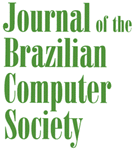LETTER FROM THE EDITOR-IN-CHIEF
The Journal of the Brazilian Computer Society objective is to publish original quality research papers, serving as a forum for promoting research in all fields of computer science. All submissions are peer reviewed by society members. This is a very relevant community service and it defines the journal's quality. Fortunately, the invited reviewers are being very helpful in accomplishing this task.
The first paper in this issue is entitled "Statistical Learning Approaches for Discriminant Features Selection" by Giraldi, Rodrigues, Kitani, Sato and Thomaz. Statistical learning theory explores ways of estimating functional dependency from a given collection of data. The specific sub-area of supervised statistical learning covers important models like Perceptron, Support Vector Machines and Linear Discriminant Analysis. The authors review the theory of such models and compare their separating hypersurfaces for extracting group-differences between samples. Classification and reconstruction are the main goals of this comparison. Finally, they show recent advances illustrating their application on face and medical image databases.
The second paper has the title "Compositional Abstraction of CSPZ Processes". Farias, Mota and Sampaio present a compositional and systematic approach to data abstract CSPZ specifications even when communications are based on infinite domains, dealing with a larger class of specifications than the previous techniques. Their approach requires that the domains being abstracted do not affect the behavior of the system. This criterion is used to achieve an internal partitioning of the specification in such a way, that complementary techniques for abstracting data types can be applied to the components of the partition. They propose an algorithm that implements the partitioning and apply their approach to a real case study.
The third paper has the title "Helly Property, Clique Graphs, Complementary Graph Classes, and Sandwich Problems". Dourado, Petito, Teixeira and Figueiredo contribute to the study of the complexity of graph sandwich problems by considering the Helly property and complementary graph classes. Graph sandwich problems were first defined in the context of Computational Biology as natural generalizations of recognition problems. The recognition problem for the class of clique graphs was a long-standing open problem that was recently solved. They show that the sandwich problems for the graph classes: clique, clique-Helly, hereditary clique-Helly, and clique-Helly nonhereditary are all NP-complete. Finally, the authors propose the study of the complexity of sandwich problems for complementary graph classes as a mean to further understand the sandwich problem as a generalization of the recognition problem.
The last paper by Pinho, Bowman and Freitas is entitled "Cooperative Object Manipulation in Collaborative Virtual Environments". Cooperative manipulation refers to the simultaneous manipulation of a virtual object by multiple users in an immersive virtual environment. For example, applications in simulation and training mimic real world tasks via simultaneous manipulation of objects in virtual environments. 3D applications are also being used for remote operations. They propose a framework for supporting the development of cooperative manipulation techniques, which are based on rules for combining single user interaction techniques. Based on the evaluation of cooperative manipulation scenarios, the authors state that in certain situations, cooperative manipulation is more efficient and usable than single user manipulation.
Finally, I would like to thank again all reviewers for their valuable evaluation of the papers.
Hugo Fuks
Editor-in-Chief
Catholic University of Rio de Janeiro
Department of Informatics
Rua Marquês de São Vicente, 225
Rio de Janeiro, RJ, Brazil
22453-900
Publication Dates
-
Publication in this collection
24 Oct 2008 -
Date of issue
2008

